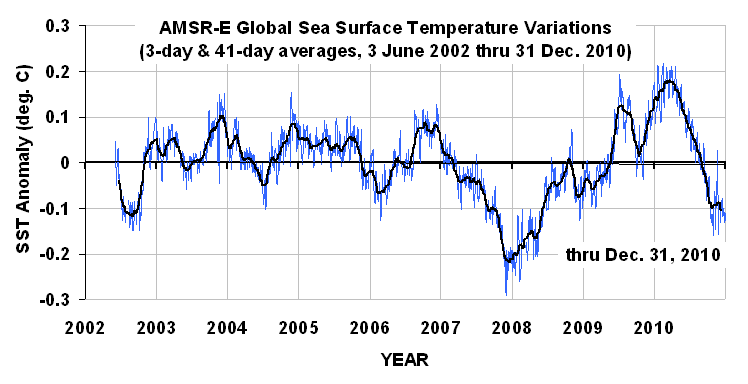
Posted on 01/03/2011 4:33:42 PM PST by Signalman
The following plot shows global average sea surface temperatures from the AMSR-E instrument over the lifetime of the Aqua satellite, through Dec 31, 2010. The SSTs at the end of December suggest that the tropospheric temperatures in the previous graph (see post here) still have a ways to fall in the coming months to catch up to the ocean, which should now be approaching its coolest point if it follows the course of previous La Nina’s.

Nah, looks to me like she makes her own heat.
:)
THE ACQUITTAL OF CARBON DIOXIDE
by Jeffrey A. Glassman, PhD
ABSTRACT:
"Carbon dioxide in the atmosphere [historically] is the product of oceanic respiration due to the well-known but under-appreciated solubility pump. Carbon dioxide rises out of warm ocean waters where it is added to the atmosphere. There it is mixed with residual and accidental CO2, and circulated, to be absorbed into the sink of the cold ocean waters. Next the thermohaline circulation carries the CO2-rich sea water deep into the ocean. A millennium later it appears at the surface in warm waters, saturated by lower pressure and higher temperature, to be exhausted back into the atmosphere. Throughout the past 420 millennia, comprising four interglacial periods, the Vostok record of atmospheric carbon dioxide concentration is imprinted with, and fully characterized by, the physics of the solubility of CO2 in water, along with the lag in the deep ocean circulation.
Notwithstanding that carbon dioxide is a greenhouse gas, atmospheric carbon dioxide has neither caused nor amplified global temperature increases. Increased carbon dioxide has been an effect of global warming, not a cause [historically -etl]. Technically, carbon dioxide is a lagging proxy for ocean temperatures. When global temperature, and along with it, ocean temperature rises, the physics of solubility causes atmospheric CO2 to increase.
If increases in carbon dioxide, or any other greenhouse gas, could have in turn raised global temperatures, the positive feedback would have been catastrophic. While the conditions for such a catastrophe were present in the Vostok record from natural causes, the runaway event did not occur. Carbon dioxide does not accumulate in the atmosphere."
http://www.rocketscientistsjournal.com/2006/10/co2_acquittal.html
_______________________________________________________________

Oops! Sorry, I didn’t realize this was a thread I had posted the CO2 piece on already. Just woke up a few mins ago.
I don't think it would hold for the ocean though. The pool is a relatively closed system, the ocean has too many variables.
Disclaimer: Opinions posted on Free Republic are those of the individual posters and do not necessarily represent the opinion of Free Republic or its management. All materials posted herein are protected by copyright law and the exemption for fair use of copyrighted works.